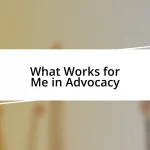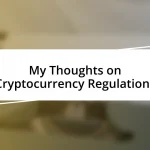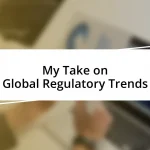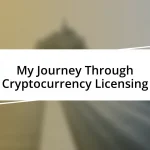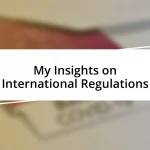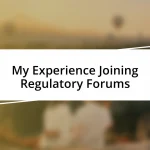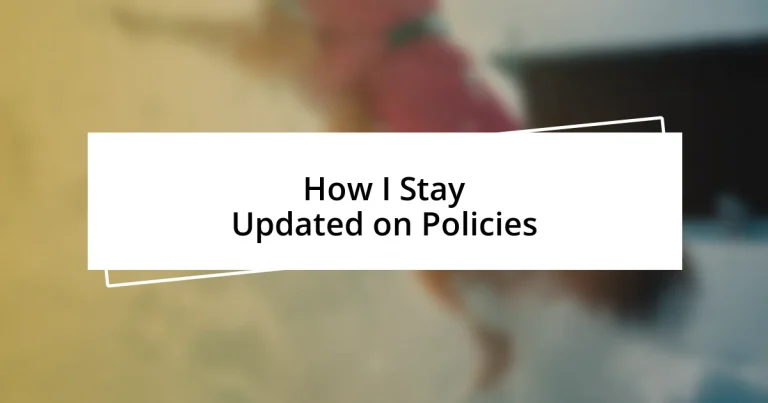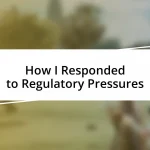Key takeaways:
- Understanding policy updates requires curiosity and engagement with professionals to grasp their significance and implications.
- Identifying reliable information sources involves checking authority, citations, reputation, updates, and objective language to avoid misinformation.
- Engaging with professional networks, following experts, and subscribing to newsletters fosters community learning and helps translate information into personal and professional action.
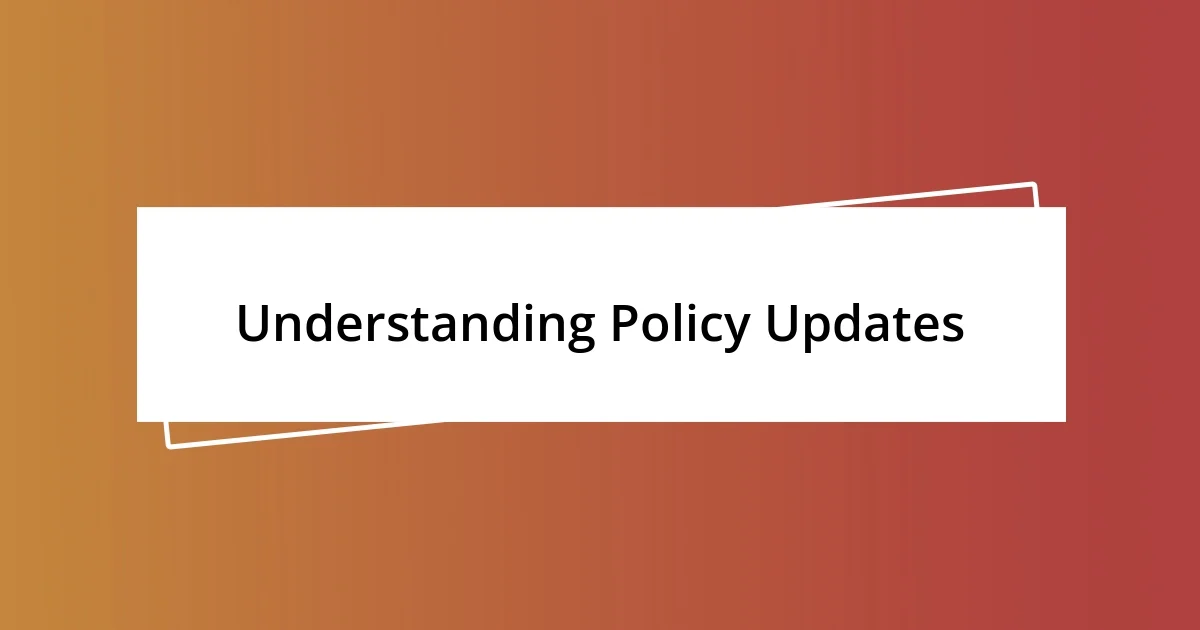
Understanding Policy Updates
Understanding policy updates can feel overwhelming, especially with the rapid pace of changes today. I remember a time when a significant change in health policy caught me off guard. I hadn’t kept myself updated, and suddenly I found myself grappling with new regulations that directly affected my work. How often do we allow ourselves to drift without realizing the tides are shifting around us?
When I encounter policy updates, I approach them like a puzzle, trying to piece together the implications. It’s fascinating to dissect why a certain policy was altered and how it reflects larger societal shifts. For instance, when data privacy laws were updated recently, I found myself questioning how these changes would impact not just businesses but our day-to-day interactions online. Isn’t it intriguing how interconnected our lives are with these decisions?
I’ve learned that understanding these updates means staying curious and proactive. I engage with professionals through forums and discussions, and these conversations often spark insights I wouldn’t have discovered alone. The community aspect of learning about policies is invaluable—what better way to grasp complex issues than by sharing perspectives and experiences with others who are navigating the same challenges? It’s not just about knowing the changes; it’s about understanding their significance and potential impact, both personally and professionally.
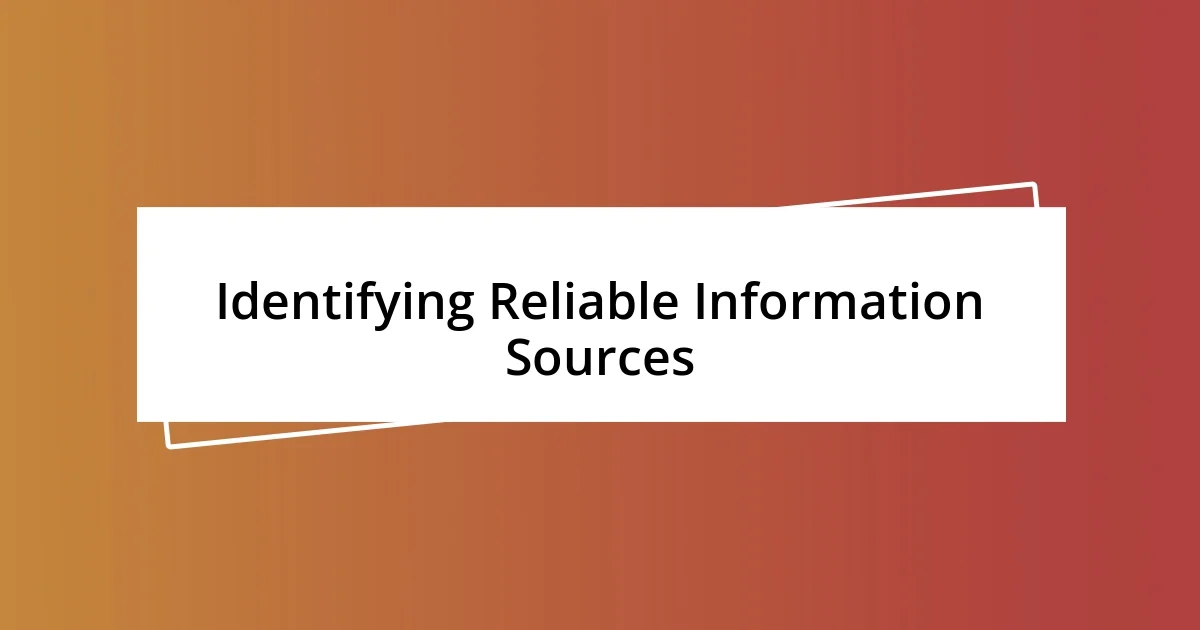
Identifying Reliable Information Sources
To identify reliable information sources, I’ve developed a keen eye for credibility. When I first dove into the world of policy updates, it was easy to get swept away by sensational headlines or biased opinions. I remember stumbling across a blog that claimed to break major policy news, but the sources cited were vague, leaving me doubting the validity of the information. Now, I prioritize sources that demonstrate transparency and authority.
Here’s what I look for in reliable information sources:
- Authority: Check if the author or organization has expertise in the field.
- Citations: Reliable sources often reference studies, reports, or official documents.
- Reputation: Established media outlets or governmental websites typically uphold rigorous standards.
- Updates: I value sources that regularly update their information, reflecting ongoing changes.
- Objective Language: Watch out for emotionally charged or biased language; it’s often a red flag.
Cultivating this discerning mindset has saved me from misinformation, and I feel more confident navigating complex policy landscapes. It’s a habit that has not only informed my decisions but has also empowered me to engage thoughtfully with the ever-evolving world of policies.
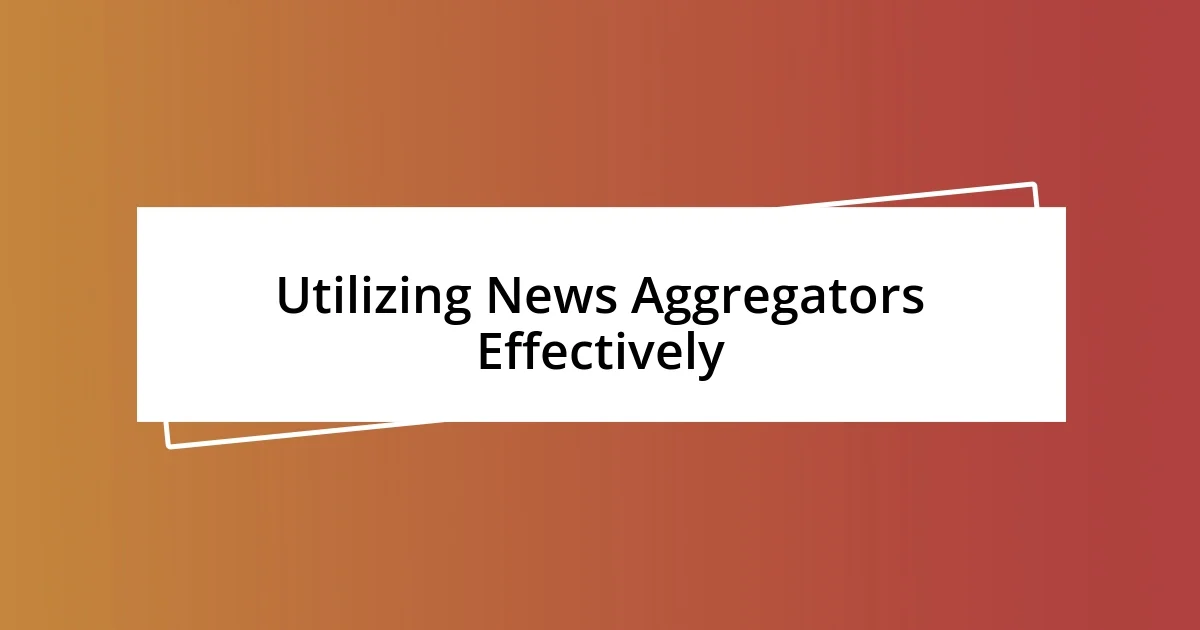
Utilizing News Aggregators Effectively
Utilizing news aggregators has significantly transformed the way I consume information about policy updates. They provide a convenient way to compile the latest developments from various sources in one place. I still recall my first experience with an aggregator; it felt like being handed a treasure map leading me to the gold mines of information. Now, navigating through top stories and trending discussions has become second nature, and the ability to filter out noise is invaluable.
I find it helpful to customize my aggregator settings to prioritize topics that matter to my work and interests. For instance, I follow specific tags related to healthcare reform and data privacy. This personal touch allows me to stay focused on relevant updates while avoiding the overwhelming flood of information that can lead to analysis paralysis. It’s like having a personal assistant who knows exactly what I need—while I’m juggling other responsibilities, I’m still in the loop without feeling swamped.
Additionally, engaging with the community features often available on these platforms enhances my experience. I’ve spotted threads where users collaborate to decode complex policies, sharing insights I might not have considered. These discussions foster a unique blend of learning and support. For example, I once joined a conversation that led to discovering a government workshop on important new legislation. Encouraged by others, I attended—and it made a huge difference in how I viewed those policy shifts.
| Feature | Value |
|---|---|
| Customization | Prioritize topics of interest for relevant updates. |
| Community Engagement | Collaborate with others to enhance understanding of policies. |
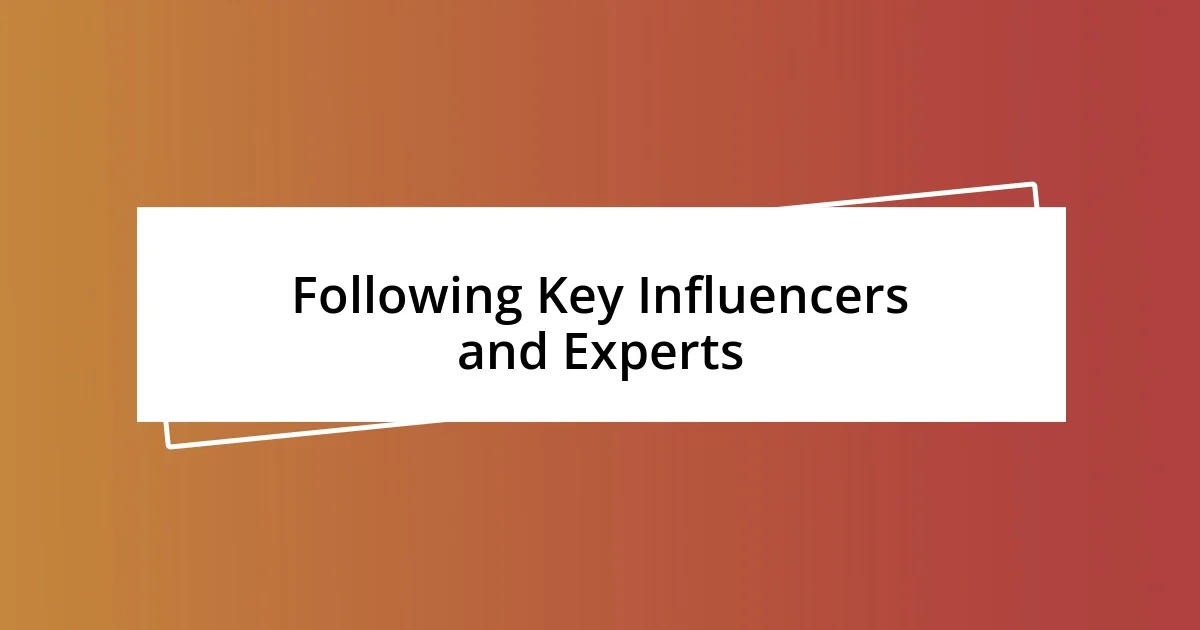
Following Key Influencers and Experts
To really stay informed about policies, I’ve found that following key influencers and experts is essential. These individuals often provide insights that you won’t find in traditional news sources. I distinctly remember coming across a thought leader in environmental policy whose Twitter feed was a gold mine of nuanced perspectives. Not only did they share updates, but they also dissected implications—this helped me understand complex legislation on climate change in a whole new way.
Social media and professional networks like LinkedIn have also been vital in connecting with these experts. I recall when I attended a webinar featuring a renowned policy analyst; their ability to break down intricate legal jargon into digestible explanations was impressive. It made me consider: how often have I read articles and felt lost in the technical details? Following experts on various platforms has changed the game for me, allowing me to engage directly with their content and even ask questions. That interaction not only boosts my understanding but also enriches my network.
I also appreciate how these influencers often highlight emerging trends before they hit mainstream discussions. For example, I once spotted a post from an economist discussing the potential impact of digital currency regulations long before the topic became a widespread concern. This foresight encouraged me to dive deeper into the subject and explore its implications for my own work. It’s a reminder that in the fast-paced world of policies, being attuned to the voices of experts can provide a significant advantage.
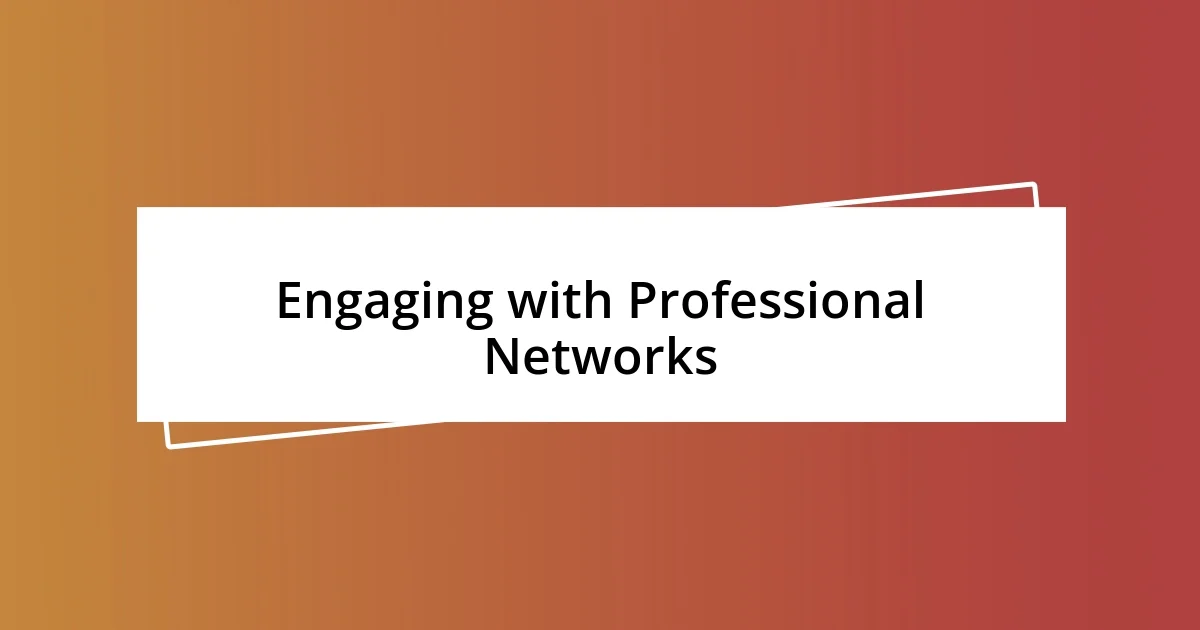
Engaging with Professional Networks
Engaging with professional networks is one of my favorite ways to stay updated on policies. I remember attending a networking event where I met like-minded professionals who shared a passion for public policy. It felt invigorating to connect with others who understood the intricacies of our field. Through these conversations, I gained insights that I hadn’t encountered in articles or news reports. Sometimes, it’s in these off-the-cuff discussions where the real gems of knowledge lie.
What truly enhances my experience is the variety of platforms available for engagement. I’ve found that joining specialized groups on Facebook and LinkedIn allows me to tap into a broader network of experts and peers. Just recently, I participated in a lively discussion about healthcare policy reforms in one of these groups. The way members shared personal experiences and case studies added layers of understanding that reading alone simply can’t provide. Have you ever gained clarity on a complicated issue just from someone else’s story? It’s a remarkable reminder of the power of community in our learning journey.
Sometimes, engaging with professional networks leads to unexpected opportunities. For instance, I once shared an article I found insightful with a colleague at a conference. This sparked a conversation that eventually led to a collaboration on a research project. It left me wondering how many potential partnerships are out there, waiting to be discovered through open dialogue with others. The connections we build not only keep us informed but can also shape our careers in ways we may not foresee.
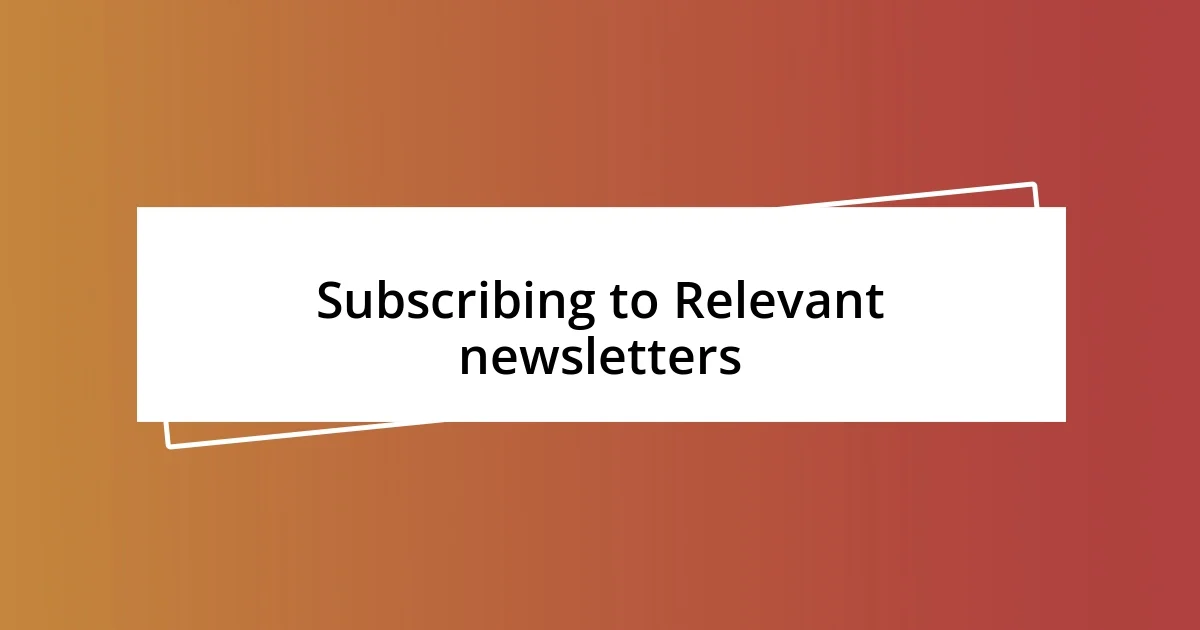
Subscribing to Relevant newsletters
Subscribing to relevant newsletters has become a fundamental part of my information-gathering strategy. The delight I feel when a new issue of my favorite policy-focused newsletter lands in my inbox is palpable. I distinctly remember a time when I stumbled upon a newsletter dedicated to education policy reforms. Every article was not just informative—it ignited my passion for advocating change in my local school system. Isn’t it amazing how a simple subscription can spark such motivation?
What I truly value about newsletters is their curated content. I often find analyses and updates that are tailored precisely to my interests, saving me from sifting through countless articles. For example, a recent edition of a newsletter I subscribe to highlighted key changes in immigration policy, complete with expert commentary. As I read, I found myself nodding along, thinking about how this information directly impacts our community. Have you ever felt that connection when reading something so relevant to your field?
Another aspect I appreciate is the consistency that comes with these newsletters. Knowing that I’ll receive insightful updates on a specific schedule grounds my routine and keeps me engaged. I’ve built a habit of setting aside time every week to read through them thoroughly. This not only keeps me informed but also fosters a sense of accountability in my quest for knowledge. After all, in the ever-evolving landscape of policies, staying updated is not just beneficial; it’s essential.
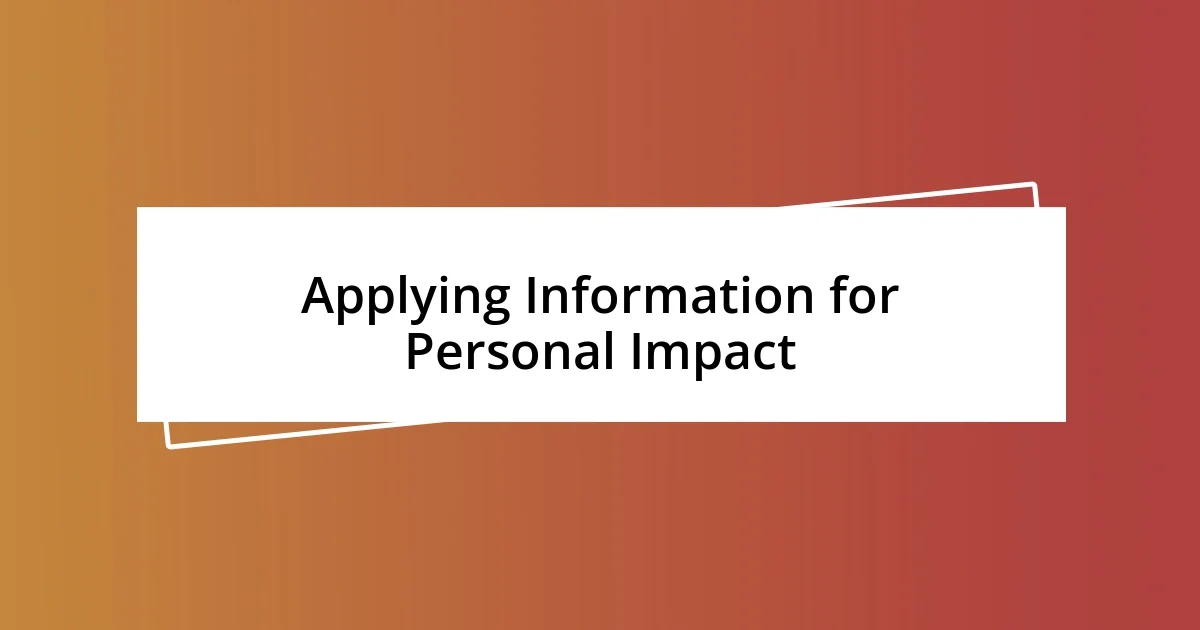
Applying Information for Personal Impact
Applying what I learn from news articles and discussions often leads to tangible changes in my daily life. For instance, after reading about new environmental policies, I decided to implement recycling practices at home more rigorously. It may seem simple, but this choice not only contributes to sustainability but also inspires my friends and family to think about their own impact. Have you ever experienced a shift in your habits after reading something impactful? It’s incredible how information can motivate personal change.
I’ll never forget the moment I took a workshop on mental health policies and their implications for workplace environments. The insights I gained moved me to advocate for better mental wellness programs at my job. I remember presenting the ideas to my team, drawing on the strategies I learned. Seeing my colleagues nod in agreement and getting their buy-in was a profound moment; it solidified my belief that applying information can trigger a ripple effect. How often do we overlook our ability to influence change just by sharing knowledge?
When I reflect on my journey of applying information, I often think about the conversations I’ve initiated. They have enriched my understanding and helped others in my circle as well. A casual chat with a friend about healthcare policy led to us volunteering for a local nonprofit advocating for better health access. It felt rewarding to turn conversation into action. Have you considered how a simple dialogue could lead to meaningful involvement in your community? It’s moments like these that remind me how essential it is to not just absorb information but to act upon it.


